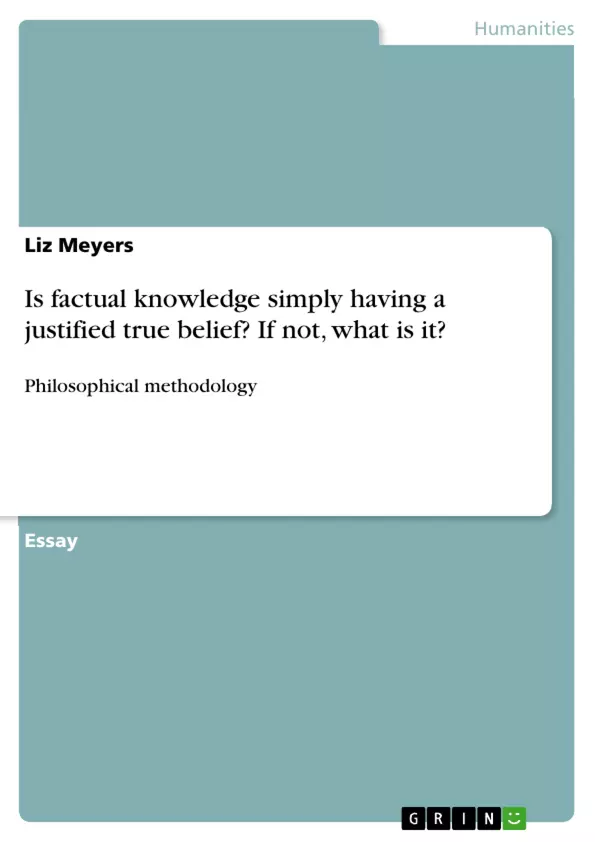Is factual knowledge simply having a justified true belief? If not, what is it?
What are necessary and sufficient conditions for a person's having knowledge about something? Finding a generally accepted answer to this question proves itself to be difficult. There have been countless attempts of constructing a definition of knowledge until a trend in the philosophical literature could be identified. From this then a traditional conception emerged, which is widely agreed on and has become the standard definition for knowledge. According to the understanding of knowledge as “Justified True Belief”, propositional knowledge exists, when three conditions are all fulfilled:
S knows that p if and only if:
1) S believes that p
2) p is true
3) S is justified in believing that p
The following essay presents different arguments with the intention to lead to an answer to the following questions: Is factual knowledge simply having a justified true belief? If not, what is it? I will argue for the view that having a justified true belief is not sufficient for factual knowledge.
Inhaltsverzeichnis (Table of Contents)
- I. Essay: Is factual knowledge simply having a justified true belief? If not, what is it?
- II. Bibliography
Zielsetzung und Themenschwerpunkte (Objectives and Key Themes)
This essay aims to investigate the necessary and sufficient conditions for knowledge, specifically questioning whether the traditional "justified true belief" (JTB) definition accurately captures factual knowledge. The essay explores arguments for and against the JTB analysis, examining counter-examples and alternative theories.
- The Justified True Belief (JTB) theory of knowledge
- Gettier problems and counterexamples to JTB
- The role of justification and its strength in knowledge claims
- The concept of epistemic luck and its impact on knowledge
- Alternative theories of knowledge, such as the causal theory
Zusammenfassung der Kapitel (Chapter Summaries)
I. Essay: Is factual knowledge simply having a justified true belief? If not, what is it?: This essay delves into the philosophical question of defining knowledge, focusing on the widely accepted "justified true belief" (JTB) theory. It presents arguments challenging the sufficiency of JTB for factual knowledge, primarily through examination of Gettier problems. These problems highlight scenarios where a belief might be justified and true but still lack the quality of knowledge due to factors like luck or coincidences. The essay explores various attempts to refine or replace the JTB theory by addressing issues like weak justification, defeaters, and the causal connection between belief and truth.
Schlüsselwörter (Keywords)
Factual knowledge, justified true belief (JTB), Gettier problem, epistemic luck, justification, causal theory of knowledge, defeaters, knowledge, belief, propositional knowledge.
Frequently asked questions
What is the main topic discussed in this document?
This document previews an essay examining the definition of factual knowledge, specifically whether it can be simply defined as "justified true belief" (JTB). It also explores alternative theories of knowledge.
What is the "justified true belief" (JTB) theory of knowledge?
The JTB theory posits that knowledge requires a belief to be true and justified. In other words, someone must believe something, that thing must be factually correct, and the person must have good reasons or evidence to support their belief.
What are Gettier problems and why are they relevant?
Gettier problems are counterexamples to the JTB theory. They describe situations where someone has a justified true belief, but the belief is true due to luck or coincidence, rather than genuine knowledge. These problems highlight the insufficiency of JTB as a complete definition of knowledge.
What are some key themes explored in the essay?
The essay focuses on the JTB theory, Gettier problems, the role and strength of justification, the concept of epistemic luck, and alternative theories of knowledge like the causal theory.
What is the essay's objective?
The essay aims to determine the necessary and sufficient conditions for knowledge, questioning whether the JTB definition adequately captures the essence of factual knowledge. It analyzes arguments both for and against the JTB account.
What are some alternative theories of knowledge mentioned in the document?
The document mentions the causal theory of knowledge as an alternative to the JTB theory. The essay explores these alternatives in its discussion.
What are "defeaters" in the context of knowledge?
Defeaters are pieces of information or evidence that, if known, would undermine the justification for a belief, potentially preventing it from counting as knowledge even if it's true.
What are the keywords associated with this document?
The keywords are: Factual knowledge, justified true belief (JTB), Gettier problem, epistemic luck, justification, causal theory of knowledge, defeaters, knowledge, belief, propositional knowledge.
- Quote paper
- Liz Meyers (Author), 2022, Is factual knowledge simply having a justified true belief? If not, what is it?, Munich, GRIN Verlag, https://www.hausarbeiten.de/document/1559917


